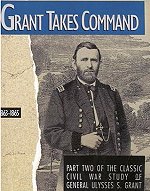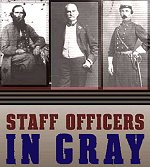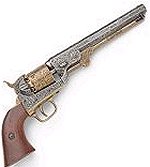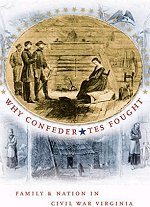|
The political, economic, and military strength of the Union was much greater than that of the Confederacy. However, the war did last four years. The Confederacy proved itself resilient on many occasions. Throughout the war the tide constantly shifted, and with that so did the political, economic, and military strength of either side. Although each side had its share of military successes, in the end, the superior Northern economy, centralized government and overwhelming manpower would eventually lead to victory. In mid 1863, both the Union and the Confederacy could have won the war although; the Confederacy lacked the industry, or manpower to wage a long war with the Union.
The Union was far more industrialized than the South. The North possessed 80% of total U.S. industry. In addition, most Confederate industry was located in the Upper South-particularly in Virginia. The Confederacy lost a great deal of potential industry and manpower when West Virginia, Kentucky, Delaware, and Maryland joined the Union instead of the Confederacy. The loss of these states to the Union was as much a testament to shrewd northern politics (Maryland) as it was to opposition within the states (West Virginia). Confederate industry, especially with the loss of these states, was unable to compete with the Union.
In addition to the South's lack of industry, most capital was invested in slaves and land-both of these are non-liquid. The South's lack of a large supply of liquid capital made it difficult for Southerners to buy munitions for the war effort. As a result of the South's lack of liquid capital the North enjoyed a decided advantage..
The south also lacked the factories, and other facilities (ironworks, etc.) to create cannons, rifles as well as other weapons. At the beginning of the war, the Confederacy only had one ironworks-located in Richmond. This was in stark comparison to the northern industrial juggernaut. The North had begun to industrialize in the early part of the century, this in relation to a primarily agricultural south. In 1860, 84% of Southerners worked in agriculture compared with only 40% of Northerners. The North also invested three times as much per capita in manufacturing by this same time. In 1860, only 25% of all railroads passed through the South. The South lacked the necessary industrial, and transportation infrastructure to wage an effective war.
In addition to the South's lack of industry, most capital was invested in slaves and land-both of these are non-liquid. The South's lack of a large supply of liquid capital made it difficult for Southerners to buy munitions for the war effort. As a result of the South's lack of liquid capital the North enjoyed a decided advantage.
The Confederacy was also unable to raise money for the war effort effectively. In war there are three ways to raise capital: printing currency, issuing bonds, or through taxing. The Confederacy was not in favor of taxing heavily, however most of the taxes they levied were on the lower classes. Under the premise of states' rights they believed it violated these principles. There were few Southern banks so that made issuing bonds diff icult, as well as the fact that as the war wore on and it became unlikely the South would win Southerners stopped investing on the belief they would win the war. This left only printing money. The drawback with this was that it led to hyperinflation. The more money the South printed the more inflation there was. In 1865, the annual inflation in the South had reached 9000%. The Confederates unending quest for liquid capital had ended in economic disaster.
The South's lack of liquid capital or inability to raise money was not its biggest economic problem. The South's lack of gold to give an intrinsic value to its currency was probably its biggest problem. Instead of using gold to determine the money's value, the value was gauged on the public's belief of their winning the war. In times of military success the currency would have a greater value than in those of defeat. The lack of a stable currency added to the difficulties faced by the Confederacy when they tried to raise money through bonds, because if the money was valueless than how would interest on near valueless currency help the investor. The South only manage to raise 2% of total capital through bonds or taxes, compared with the North, which raised most of its capital that way.
The Confederacy was also unable to raise money for the war effort effectively. In war there are three ways to raise capital: printing currency, issuing bonds, or through taxing. The Confederacy was not in favor of taxing heavily, however most of the taxes they levied were on the lower classes. Under the premise of States' rights they believed it violated these principles. There were few Southern banks so that made issuing bonds difficult, as well as the fact that as the war wore on and it became unlikely the South would win Southerners stopped investing on the belief they would win the war. This left only printing money. The drawback with this was that it led to hyperinflation. The more money the South printed the more inflation there was. In 1865, the annual inflation in the South had reached 9000%. The Confederates unending quest for liquid capital had ended in economic disaster.
The political strength of the South was hampered by its belief in States' rights. "Jefferson Davis never enjoyed the sweeping political power of Lincoln." The South lacked a powerful bureaucracy and much power rested in the hands of local governors. The Southerners refused to give Davis the same political powers as Lincoln out of fear he would misuse it. Davis was never allowed to suspend habeas corpus as frequently or for as long duration as Lincoln. The South however committed to States' rights as it was, failed to realize that during a war your President must have sweeping powers in order to maintain internal stability.
The Confederacy was also not as unified as is commonly thought. Parts of the Confederacy were extremely loyal while others such as East Tennessee were hotbeds of Unionist activity. These citizens resisted Confederate drafts, and refused to pay Confederate taxes. Many of these Unionists formed groups to resist the Confederate government. Confederate loyalists persecuted unionists in East Tennessee and in other areas. Nevertheless, internal opposition to the Confederacy hurt the stability of a region as well as undermined the war effort.
The military situation for the South was far less bleak. The South had many great generals compared to the North's few. In 1863, "The Army of the Potomac had seen its sixth leader in two years." The South, on the other hand, would have Robert E. Lee in command throughout most of the war. The South was also fighting a mostly defensive war. However, the South was routinely outnumbered two to one on the battlefield. Early in the war, the Confederacy enjoyed the advantage of slave labor. This led to several early Southern victories in 1861. As the war progressed, the North was able to lessen and then finally negate this advantage by abolishing slavery.
The situation of the Union armies of the West was the exact opposite of The Army of the Potomac. The Western armies were under the command of better generals (Grant, and Sherman) and those generals were more offensive minded than the timid generals of the army of the Potomac. Grant and Sherman attacked frequently and used their bigger, better-equipped armies to their advantage. These Western generals such as Grant and Rosecrans would command The Army of the Potomac later in the war, when this would occur the Union would have the one advantage it had lacked early in the war.
Up until Grant took over The Army of the Potomac (after Gettysburg), each of its commanders was able but had one character flaw which prevented him from being a great general. McClellean was too cautious, Hooker lacked self-confidence, and Meade lacked skills as a military tactician. With these poor leaders at the helm The Army of the Potomac was unable to fight as effectively as its numbers would suggest.
Despite all these advantages (political, and economic not military), the Confederacy had a chance to win the war in mid 1863. Since Lee had taken command of The Army of Northern Virginia, in 1862, the Confederacy had won a string of victories with the exception of Antietam. Lee's victories at Chancellorsville, and Fredericksburg led him to launch an invasion of the Union. The Union and Confederate armies would meet at Gettysburg.
Lee chose to invade Pennsylvania to forage and, more importantly, to take some pressure off of Virginia. Lee was forced to take some pressure off of Virginia, because it was one of the main agricultural regions of the South. Lee also had to go on the offensive, because his army was so poorly equipped that they would not have been able to win a long war with the North. His army was often without shoes, and would generally fight in tattered rags instead of uniforms. The Confederates also lacked an adequate supply of horses, which hampered reconnaissance as well as troop movement. Although outnumbered, Lee's army still fought gallantly and effectively.
At Gettysburg the outnumbered rebels were defeated. This coupled with the fall of Vicksburg marked the turning point of the war. From then on Lee was unable to regain the initiative. Except for a brief period of time in 1864, the South was on the defensive for the remainder of the war. After mid 1863 the war was all but decided all that remained, now, was two years of needless slaughter.
As time wore on the industrial might of the Union prevailed. The Confederates had always had problems clothing and feeding their armies, however, as the war wore on the difficulties became more exaggerated. There was also civil unrest in the Confederacy as is evidenced by the Richmond Bread Riots. From the beginning, it was obvious that a long war would favor the Union. Although much of this was due to the North's industrial economy in comparison to the South's agricultural economy, the Union saw an increase in production (mostly in war related goods) while the Southern economy collapsed. This added to better commanders leading The Army of the Potomac would ultimately lead to the South's defeat. The Civil War saw the tensions caused by two competing regions-North and South-come to a head. The South was poorly prepared for war. Its lack of industry, unstable currency, inability to raise capital, and lack of manpower helped lead to its downfall.
Equally as important, I believe, was the lack of cooperation between the state, and federal governments, as well as, the lack of unity in certain areas of the Confederacy-East Tennessee in particular. Although mid 1863 was the turning point, the war would rage on for two more years and claim 620,000 lives.
|










